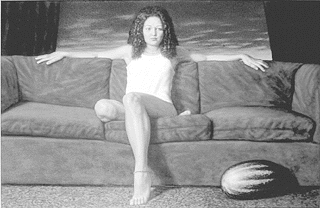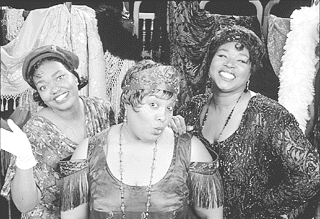Exhibitionism
Chronicle arts reviews
Fri., Feb. 6, 1998
NAKED TEXAS ART: SENSUOUS WOMEN AND BITTER EXES
Holy 8 Ball Studios,
through February 28

Two things are immediately apparent with James Johnson's paintings: They are executed by a man with exceptional talent as a painter, and they serve as an obvious metaphorical pressure valve for his highly charged emotions. Put these two components together and you get a complex web of expressionist images wrought with technical grace.
Johnson's intricately detailed, mechanically fine technique has earned him the deserved reputation as one of Texas' best figurative painters, and this show's amazingly lifelike paintings confirm his stature. He devotes as much fine-tuned attention to the shadows cast by a woman's mass of curly tendrils as to the etched lines formed by her pinched lips, achieving a remarkable realness that is at once hypnotic and disconcerting for the viewer.
The emotions and situations explored in the paintings are nothing new: love, betrayal, lust, fear. Yet Johnson achieves a rare, gut-wrenching earnestness that sets his work apart from the average collection of emotional-roller-coasters-on-canvas. Johnson's sentiments are real, believable, and in your face, as though you can hear these screaming scorned lovers and feel the seductive lure of the scantily clad women.
This is the stuff of Johnson's work: the timeless exploration of sensuous women and bitter exes. Women in various states of sentiment (and nakedness) appear in almost every work, sometimes with an air of disdain, as with the eye-rolling gal in Couched Women With Phone, and sometimes looking demonic, like the eyeless woman in Abandoned Church. Often they are sultry and inviting, as with the relaxed woman on a huge, brilliantly crimson couch in Couched Woman With Melon. The furniture's plush, velvet texture and the woman's warm, come-hither countenance make this a thoroughly sensual piece, rivaling any form of less sublime erotica.
Johnson has frequently been criticized over the years for his work – mainly by feminists, viewing his portrayal of women as bitchy sex objects or heartless vamps. These images undoubtedly exist in his paintings, but they are balanced by equal senses of awe of and reverence for the female psyche and, of course, a fascination with the female form. If anything, many of his pieces have a self-deprecating quality, with Johnson depicting himself as a mere simpleton among the complex workings of these women. --Cari Marshall
BLUES IN THE NIGHT: AFTER MIDNIGHT
Zachary Scott Theatre Center,
through February 22
Running Time: 1 hr, 45 min

On worn sheets on a thin mattress on a resting place more cot than bed, a woman sits alone. She slumps in the dim light, clad only in a slip, cradling in her lap a book of memories of better times, her eyes cast down toward it, and without her saying a word, we can guess her state. When she lifts her head and opens her mouth, pouring forth an elegy for her life in high and mournful music, we lose all doubt. She's in the throes of the blues.
That's the nub of this revue conceived by Sheldon Epps, and it's perfectly expressed in the show's title, lifted from the standard by Harold Arlen and Johnny Mercer. This is blues in the night – and nothing but that. The show features 27 numbers in styles ranging from the polished pop of Mercer and Arlen to the sophisticated swing of Duke Ellington and Billy Strayhorn, the roguish raunch of Wesley Wilson to the earthy laments of Bessie Smith. They're stitched together inside a frame that suggests a narrative– there's a setting, a Chicago hotel, and characters: The Lady From the Road, The Woman of the World, The Girl With a Date,and The Man From the Saloon – but no larger story develops. The real drama here is in the songs, in their three-minute chronicles of love, lust, loss, despair, survival.
For its production, the Zachary Scott Theatre Center is fortunate to have performers who can sink into these miniature dramas, uncover their emotional cores, and deliver them with feeling. Janis Stinson conveys the isolation of a lonely hotel room at the end of the line in the line of her shoulders and keening edge in her voice. And she dishes up bawdy pleasures, shimmying downstage, eyes at half-staff and mouth a pearly crescent, her testimony to the prowess of her "KitchenMan" a sly growl of satisfaction. Felicia Dinwiddie etches young emotion in all its sharpness, her version of "Taking a Chance on Love" as exuberant as a lark in springtime and her "Willow Weep for Me" low and fragile with the sting of youthful disillusionment. Jacqui Cross communicates the pain of age and experience, in eyes misty with regret and a plaintive voice weighted with broken dreams.And representing the men responsible for many of these heartaches, Roderick Sanford exudes rakishness, his voice all deep, smooth allure.
The production suffers a bit from the show's structure. One can sense a rough dramatic arc in the songs' order, but in performance they do little to build on each other or develop a mood. Director Dave Steakley, who was able to mask similar drawbacks in other revues with smart gestures and slick turns, wisely refrains from that here (the better to serve the material), but the trade-off is that his staging options are limited (and grow somewhat repetitive) and the threadbare quality of Epps' set-up is evident.
But this show isn't about stage moves. It's about music and mood, and Steakley and his artistic team deliver that in abundance. Michael Raiford's set, with flats of stylized smokestacks and skyscrapers painted to evoke Thirties art, and his compact playing spaces faced in brick, carry us back a half-century to a faded hotel where you can almost hear the pitiless Chicago winds whistling beyond the windows. Robert Whyburn's lighting favors – what else? – blues, in shades that summon those hours after midnight when it's just you, a bottle, and the dark. In this setting, with a band that lays down the tunes with a lazy, boozy bump, the singers are able to lose themselves in the night and the melody and the feeling that is the blues. And it feels so bad, it's good. --Robert Faires
ARCADIA: WONDERFUL TRUST-FALL
The Acting Studio,
through Febuary 14
Running Time: 2 hrs, 40 min
Pardon me while I gush. It's something I do infrequently, but will if a situation requires ebullient words that can only brush the surface of a magnificent production. The critic's lot is to be habitually unfulfilled and a special note must be made when a pleased – nay, thrilled – reviewer leaves a theatre. Not a mere Post-It type note, but an encouragement writ large across the page: Go see this show.
Part of what makes this Different Stages production of Tom Stoppard's Arcadia is its sheer lack of noise. Noise, for those unfamiliar with the word in this context, is something that interferes with communication – static, if you will, coming through on a radio channel or smudges of ink on a printed page. Theatrical noise is all those little annoyances that creep into a production that don't add to its performance, like slipped lines, fuzzy blocking, and bizarre direction. This Arcadia is nearly noise free, with little standing between the script, the actors, and the audience. Bliss to those who thrive on good, clean theatre.
Stunning performances pop from director Norman Blumensaadt's understated blocking, from Kerri St. Germain's simple, well-painted set, and from Kate Underhill's apt, illustrative costumes. The stage is littered with actors who know what to do with this script, and their skill shows with every line reading and body posture. This is a cast that meshes like the wheels of a Swiss watch, and it is difficult to single out the great performances because they are so interconnected. But that also seems to be the critic's lot, to single out those who deserve special praise, and, in all honesty, there are quite a few who are deserving in this production. Joey Hood confidently plays the lusty-in-a-pre-Victorian-way teacher Septimus Hodge and is, quite simply, charming and magnificent, as is Ramee Gentry as Thomasina Coverly, the teenaged genius child of Lord and Lady Croom. Speaking of whom, as Lady Croom, Melanie Dean gives a vivid performance just this side of arch melodrama, perfect for this diva-esque character who demands the attention of everyone in every room she enters. Kathy Lagaza is perfect as the prickly Hannah Jarvis, a historian searching for vital clues in the estate's garden. Robert Pierson's Valentine Coverly, a mathematics grad student using chaos theory to describe the movements of grouse, is endearing and utterly believable. And special praise must be lofted toward Robert S. Fisher for his dual performance as two characters who seem to know a lot more than they let on. Hell, even the accents, usually a vile sticking point for any production not set in the States, sound almost perfect.
Now, it should be no surprise that glorious performances come out of a truly incredible script. Stoppard's play is a deeply grounded, metaphysical play, which marries such diverse subjects as history and chaos theory, love and gardening, while straddling two time periods and several constructions of reality. Yet most productions of any of Stoppard's play are unsatisfying, since most productions botch up his poetry with contrived theatrics instead of relying on the playwright's beautiful words to do the work. Blessedly, this production does a wonderful trust-fall into the script and emerges victorious. --Adrienne Martini








